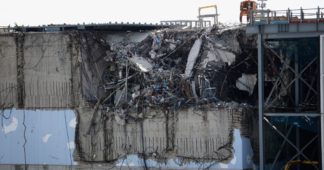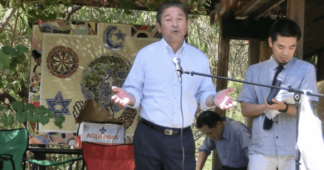By Frank Schumann
There are many islands and atolls in the Pacific. Their existence is threatened by the rising water level of the oceans. This is the result of climate change caused by the industrialised countries. The inhabitants have been consulted as little as when the colonial powers USA, Great Britain and France tested their nuclear weapons there. Now a fourth ex-colonial power has joined them: Japan. It is not testing nuclear weapons, but plans to dispose of the cooling water that has accumulated since the nuclear power plant disaster in Fukushima into the sea. The reactors destroyed at the time have been cooled since 2011. In the meantime, more than one million tonnes of radioactively contaminated water have been collected in tanks on the company’s premises. The energy company TEPCO has decided to discharge the radioactive sludge into the sea. To do this, they want to drill a kilometre-long tunnel.
The government in Tokyo has given its blessing. After all, the radiating material will be filtered and diluted, all quite harmless, they say. There is scientific expertise, for example from the International Atomic Energy Agency (IAEA), which confirms that there would be no harm to the environment or to people.
Why then, logic suggests, have 140,000 litres of contaminated wastewater been stored in tanks every day for twelve years and not immediately discharged into the sea?
The fact is that this cooling water contains tritium, a radioactive form of hydrogen that cannot be filtered out or diluted. It has a half-life of just over twelve years. Only after about a hundred years will it have decayed to the point where it does not emit more radiation than what surrounds us. In short, the stuff in the tanks would have to remain there for so long before it could be certified harmless. So Japan doesn’t want to wait that long. In capitalism, time is always money.
Fishermen in the neighbouring countries fear for their livelihoods. Even if the water did not cause any immediate damage to flora and fauna (which is doubtful), this would have consequences. As we know from Japan. Farmers and fishermen from the Fukushima prefecture have not been able to get rid of their goods since the 2011 disaster. Everything that comes from this region can no longer be sold. This is likely to happen in future to all fishermen who cast their nets in the Sea of Japan, the Yellow Sea and the East China Sea, and of course to those in the eighteen island states that have joined together to form the Pacific Island Forum (PIF).
For “the consumer” always tends to ask about the origin of products. Mussels, seaweed, fish and other sea creatures from these areas will then bear the mark of Cain: Beware contaminated! Half of the tuna caught and processed worldwide comes from this region …
The representatives of the Pacific Island Forum have been negotiating with Tokyo for months. To no avail. The fact that in the Second World War the fascist aggressor Japan had devastated many islands, that these islands were subsequently victims of the Cold War and may soon be in danger of sinking, did not move Tokyo much. In its usual capitalist manner of rule, it ignores every objection. Protests from its own population, from South Korea, China and Taiwan also went unheard.
From 19 to 21 May, the G7 summit will take place in Japan. In Hiroshima, where the USA detonated the first atomic bomb over an inhabited city in August 1945. Militarily superfluous, a war crime. Politically, however, it was a demonstration of power against the old and future enemy, with whom the USA was currently still allied. The planned Fukushima disposal is also a demonstration. Towards the neighbours as well as the rest of the world. This may initially be an imperial gesture on Japan’s part, but it is probably entirely in the interests of the Western world’s leading power. Washington wants to dominate the Pacific in order to move against China. For that, it needs allied vassals.
Also read
« Le jour où le Japon a failli disparaître »
We remind our readers that publication of articles on our site does not mean that we agree with what is written. Our policy is to publish anything which we consider of interest, so as to assist our readers in forming their opinions. Sometimes we even publish articles with which we totally disagree, since we believe it is important for our readers to be informed on as wide a spectrum of views as possible.











